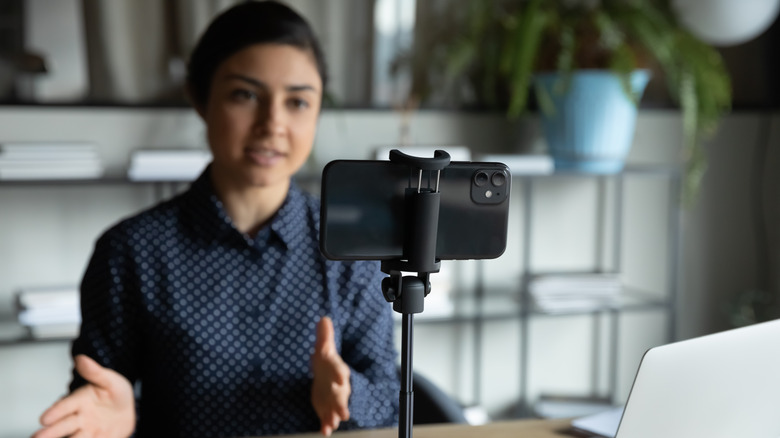Why Medical Experts Are Concerned Patient Influencers Are Sending The Wrong Message
There's no denying the power that social media and influencers have on impacting others. Whether it's marketing a product or sharing a workout routine, there's a niche for nearly every industry. In the healthcare field, social media is seeing the rise of patient influencers. According to Healthline, patient influencers are individuals who share their personal health stories while advocating for brands, pharmaceutical companies, and medical treatment. For better or for worse, their influence can sway people into trying new methods to cope with a condition or diagnosis.
Erin Willis, an associate professor at the University of Colorado Boulder, tells Healthline, "Patients have always connected with other patients online—this is not a new phenomenon. What is new, however, is that patients are using social media platforms like Instagram, TikTok, etc., to share their disease experience, and for many, that includes experience with pharmaceutical medications."
While connection and community can be a positive thing, there are concerns that the general public is at risk to be misled or misinformed (via U.S. News & World Report). After all, influencers are often sponsored and paid by companies to share glowing reviews of products. The relationship between influencers, drug companies, and consumers should be approached carefully.
Why is this a problem?
On one hand, patient influencers can create a community for other patients to bond over a condition or diagnosis. However, it can be unsafe to follow medical advice from a patient influencer instead of a certified medical expert. It's also possible patients have varying experiences, even with the same diagnosis.
Dr. Natasha Bhuyan, a family doctor in Phoenix, Arizona, explains to Healthline, "It helps other patients feel connected to a larger community, especially related to things like chronic diseases or rare conditions. However, it's important to keep in mind that this is one person's experience, and their health journey may not apply to everyone."
There have been legal efforts by the FDA and U.S. Federal Trade Commission to regulate how patient influencers share messaging with consumers (per Health Day). In order to improve credibility and ethical standards, influencers who are paid to promote products must disclose their compensation in posts, under FTC rules.
Consumers are also strongly encouraged to be on high alert on social media while viewing a patient influencers' content, and take what they share with a grain of salt. "Patient stories and patient perspective can be important, but the perspectives that are being highlighted are the ones that back marketing goals," Dr. Adriane Fugh-Berman, a professor of pharmacology and physiology at Georgetown University Medical Center in Washington, D.C., tells Health Day.


